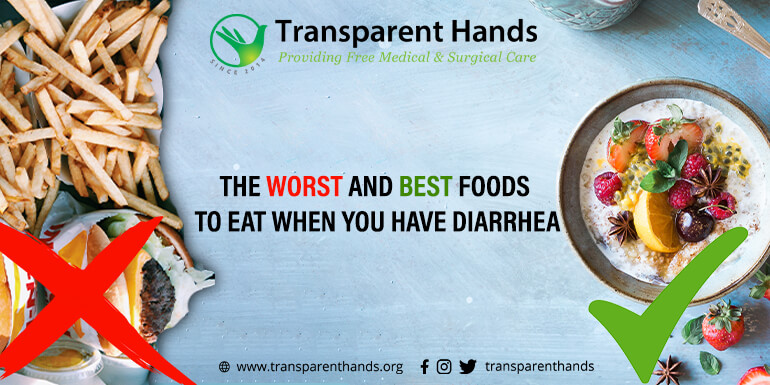The Worst and Good Foods to Eat When You Have Diarrhea

Diarrhea is a common digestive problem that can be caused by a variety of factors, including viral or bacterial infections, food poisoning, and certain medications. When you have diarrhea, it’s essential to be mindful of what you eat as certain foods can worsen symptoms while others can help to alleviate them.
Worst Foods to Eat When You Have Diarrhea
High-fat foods: Foods that are high in fat, such as fried foods, can be difficult to digest and can slow down bowel movements, making diarrhea worse.
- Dairy products: Milk, cheese, and other dairy products can be difficult to digest when you have diarrhea and can also worsen symptoms of diarrhea-related conditions such as lactose intolerance.
- Alcohol: Alcohol can cause inflammation in the gut, which can make diarrhea worse.
- Caffeine: Caffeine can act as a stimulant on the digestive system, causing diarrhea to worsen.
- Spicy foods: Spicy foods can irritate the gut, making diarrhea worse.
- Processed foods: Processed foods are high in preservatives and additives, which can irritate the gut and worsen diarrhea symptoms.
Good Foods to Eat When You Have Diarrhea
- Bananas: Bananas are high in potassium and other electrolytes, which can help to replace those lost due to diarrhea.
- Rice: Rice is a bland, starchy food that can help to absorb excess water in the gut and solidify diarrhea.
- Applesauce: Applesauce is a good source of pectin, which can help to firm up stools.
- Boiled potatoes: Boiled potatoes are easy to digest and are a good source of potassium and other electrolytes.
- Cooked vegetables: Cooked vegetables are easy to digest and can provide important vitamins and minerals.
- Chicken broth: Chicken broth can help to replace lost fluids and electrolytes and is easy to digest.
- Ginger tea: Ginger tea can help to reduce inflammation and soothe an upset stomach.
- Yogurt: Yogurt contains probiotics which can help to restore the balance of good bacteria in the gut and improve digestion
Vitamins Important to Take During Diarrhea
When you have diarrhea, it’s important to make sure you are getting all the necessary nutrients to help you recover and maintain overall health. Here are a few vitamins that can be particularly important to take during this time:
Vitamin A: This vitamin is important for maintaining a healthy immune system and is essential for the proper functioning of the gut.
Vitamin C: This vitamin is a powerful antioxidant that can help to reduce inflammation in the gut and improve overall immunity.
Vitamin E: This vitamin is also an antioxidant and can help to protect the gut from damage caused by inflammation.
Vitamin B12: This vitamin is important for maintaining healthy nerve function and is involved in the formation of red blood cells.
Vitamin D: This vitamin is essential for maintaining strong bones and teeth and also helps to regulate the immune system.
Vitamin K: This vitamin is essential for blood clotting and can help to prevent excessive bleeding during diarrheal episodes.
It is important to note that diarrhea can cause loss of nutrients from your body, so it is important to replenish these nutrients through diet or supplements under the guidance of a healthcare professional.
Health Benefits of Vitamin C
When Should I Be Worried About Diarrhea?
The majority of acute diarrhea cases go away on their own. Dehydration, however, may be life-threatening if left untreated and can result from severe diarrhea (diarrhea where oral fluid intake is significantly less than the fluid loss). Dehydration is especially dangerous for young people, the elderly, and people with compromised immune systems.
When Conditions Become Critical!
The majority of diarrhea occurrences are minor inconveniences. However, on occasion, they signal a dangerous problem. If your child has had diarrhea for more than 24 hours, consult your doctor. It can be an emergency if you have it for more than three days.
If you experience any of the following, visit the hospital:
- extreme abdominal discomfort
- stool with blood
- Tarry, black stools
- Extreme fever (greater than 101.3 F)
- Indications of dehydration
- These could be indicators of things like:
- Infection
- Colitis of the bowels
- Pancreatitis
- Stomach or colon cancer
When Diarrhea Is Relentless!
Chronic diarrhea is present if you continue to experience it after 4 weeks.
Your doctor will need to know about your symptoms and medical background to determine the cause. The following information will help you make the most of your appointment:
- The duration of the condition
- Whether your diarrhea is persistent or comes and goes
- If you believe that specific meals and circumstances improve or worsen things
- If your feces appear crimson, greasy, fatty, or liquid
- Additional symptoms you experience and their duration
- If you have a history of persistent diarrhea in your family
- Locations you’ve recently visited
- Unusual foods you’ve recently tried
- Medications or dietary supplements you may be taking
- If you have significantly shed pounds
Given all the above-mentioned points, it is important to practice excellent food and water hygiene, such as avoiding undercooked food and potentially hazardous tap water.
(The information in this article should not be taken as a substitute for professional medical advice.)










Leave Your Comments